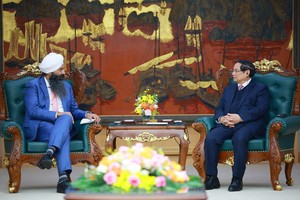HONG KONG, March 7, 2011 (AFP) - Asian stock markets had a mixed start on Monday, with the rising oil price hurting overall sentiment and Tokyo hit by political upheaval, but Shanghai in more positive mood.
Tokyo's Nikkei index was down 1.33 percent in the late morning while Sydney fell 1.19 percent. However Shanghai's Composite Index was up 1.07 percent and Hong Kong was flat.
Oil prices pushed higher, with New York's main contract reaching a new two-year high, as the conflict in Libya worsened and nervousness grew about the possibility of unrest in mammoth supplier Saudi Arabia.
A number of low-level street protests have taken place in Saudi Arabia in the last few days and the country's interior ministry put out a statement on Saturday stressing that "regulations in the kingdom forbid categorically all sorts of demonstrations, marches and sit-ins..."
New York's main contract, light sweet crude for April delivery, rose $1.33 to $105.75, while Brent North Sea crude for April was up 59 cents at $116.56.
Prices of safe-haven gold also surged, with the precious metal opening at $1,434.00-$1,435.00 an ounce in Hong Kong, well up from Friday's close of $1,416.50-$1,417.50.
Traders voiced growing concern at the situation.
"Oil prices need to stabilise while the global economy is still relatively firm, but time is running out," Hideyuki Ishiguro, a strategist at Okasan Securities in Tokyo, told Dow Jones Newswires.
Oil-price rises pushed stocks in Chinese coal miners higher. However Japanese car makers suffered, weighed by expectations that higher fuel costs will dampen enthusiasm for driving; Honda Motor fell more than three percent.
Adding to pressure in Tokyo, Japan's government was in crisis after foreign minister Seiji Maehara quit over a funding scandal.
With newspapers warning that Prime Minister Naoto Kan was "on the edge of a cliff", Hisatsune Kobayashi, analyst at Nikko Cordial Securities, warned of the risk of a further downgrade of Japan's sovereign debt rating.
Car giant Toyota, struggling after a string of recalls, also suffered a knock after ratings agency Standard & Poor's downgraded the firm to "AA-" from "AA" citing "weak profitability".
Investors in mainland China however were taking a sunnier view, after comments by a top official allayed fears of an imminent rate hike.
Zhang Ping, head of the National Development and Reform Commission, said that inflation was likely to have slowed in February.
The Consumer Price Index hit a more than two-year high of 5.1 percent in November and was still high at 4.9 percent for January. However Zhang said on Sunday as the country held its annual parliament session that "from what I have heard, the consumer price index for February could be even lower."
Zhou Lin, an analyst at Huatai Securities, said: "The market may keep its upward trend as investors expect the government won't launch further monetary tightening moves during the annual meeting if the CPI grows at a lower rate."
On currency markets the euro was weighed by profit-taking after hitting a four-month high against the dollar last week due to expectations the European Central Bank will hike interest rates next month.
However, sentiment towards the euro would likely stay "bullish", supported by data due out this week, including industrial production reports from Germany and France, Barclays said in a research note.
The single currency eased to $1.3974 in Tokyo morning trade from $1.3979 in New York late Friday. The euro fetched 115.08 yen compared to 115.05 yen.
The dollar firmed to 82.34 yen from 82.26 yen.
























